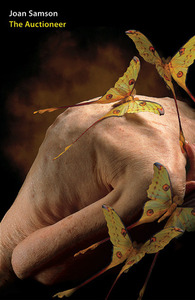You need to sign in or sign up before continuing.
Take a photo of a barcode or cover
Look, with all due respect to Joan Samson, who tragically died of cancer within weeks of this book's publication, and who is a wonderful writer, this book is more theme than story. Here's what I mean by that:
The whole premise of this story is based on the idea that a bunch of farmers with acres and acres of land they've owned for generations would allow an outsider to "smooth-talk" them into giving away a) All their earthly belongings b) All their cattle and livestock c) All their GUNS d) Their children???
I totally get that Samson was trying to make a point. But even with the idea that the whole book is an allegory for XYZ, you still need to base the tale in some sort of rooted reality. Either that, or go straight allegory so it reads as more of a fable.
But Samson tried to have it both ways. Creating a realistic thriller / horror novel with "real" characters struggling to overcome an evil interloper, and a heavily-themed allegory on material possessions or modern vs tradition or blah blah blah.
Point is this. If you ever worked on a farm, or ever knew an actual farmer, this story is as laughable as it is infuriating. Because folks, if you think a farmer would let you so much as put a fingertip on his or her belongings without catching a cloud of buckshot in the process, than you're out of your mind.
Samson would have us believe that a whole community of farmers would stand idly by while the villain and a bunch of "deputies with sidearms" take their furniture, their most sacred belongings, their tools, their livestock, inappropriately fondle their wives and seduce their children... while they all just sort of fret and pace and wonder what to do.
Yeah, okay.
Sorry, but like I said, even the most outlandish fantasies need some basis in reality, especially when they're actually shooting for realism, and this book is so frustratingly impossible that you spend the entire time mentally screaming at the characters (and the author) to show a tiny bit of realistic, empathetic humanity. (I personally know of two uncles that would have happily gunned-down and secretly buried the antagonist and his cronies by the end of chapter two).
And by the time they do finally stand up for themselves, you don't care anymore because it's been drawn out too long and you no longer believe a word of the story or care about these unrealistic people.
That all said, the writing is wonderful, and the basic premise is actually interesting, and the themes are worth exploring, but the blind eye to reality is ultimately too much to overcome.
The whole premise of this story is based on the idea that a bunch of farmers with acres and acres of land they've owned for generations would allow an outsider to "smooth-talk" them into giving away a) All their earthly belongings b) All their cattle and livestock c) All their GUNS d) Their children???
I totally get that Samson was trying to make a point. But even with the idea that the whole book is an allegory for XYZ, you still need to base the tale in some sort of rooted reality. Either that, or go straight allegory so it reads as more of a fable.
But Samson tried to have it both ways. Creating a realistic thriller / horror novel with "real" characters struggling to overcome an evil interloper, and a heavily-themed allegory on material possessions or modern vs tradition or blah blah blah.
Point is this. If you ever worked on a farm, or ever knew an actual farmer, this story is as laughable as it is infuriating. Because folks, if you think a farmer would let you so much as put a fingertip on his or her belongings without catching a cloud of buckshot in the process, than you're out of your mind.
Samson would have us believe that a whole community of farmers would stand idly by while the villain and a bunch of "deputies with sidearms" take their furniture, their most sacred belongings, their tools, their livestock, inappropriately fondle their wives and seduce their children... while they all just sort of fret and pace and wonder what to do.
Yeah, okay.
Sorry, but like I said, even the most outlandish fantasies need some basis in reality, especially when they're actually shooting for realism, and this book is so frustratingly impossible that you spend the entire time mentally screaming at the characters (and the author) to show a tiny bit of realistic, empathetic humanity. (I personally know of two uncles that would have happily gunned-down and secretly buried the antagonist and his cronies by the end of chapter two).
And by the time they do finally stand up for themselves, you don't care anymore because it's been drawn out too long and you no longer believe a word of the story or care about these unrealistic people.
That all said, the writing is wonderful, and the basic premise is actually interesting, and the themes are worth exploring, but the blind eye to reality is ultimately too much to overcome.
The sleepy traditional lives of a farming community are drawn into a nightmare by the arrival of an auctioneer with big plans. Although set in New England, the focus on class and social change has the air of a southern gothic; a sort of southern horror with no interest in the fantastic; perhaps a southern suspense novel. The build is grinding, excruciating, awesome; at the 40% mark I was already wondering how things could get worse, but they did. It's a horror rooted in disenfranchisement, in being trapped (sometimes by oneself); I sympathize too strongly with this trope, and it means this is never enjoyable, even within the bounds of the genre: there's no pleasurable tension in experiencing suffering at a heightened remove. The end is weaker, with too traditional a climax (the rising tension of the climax mirrors the rising tension of the conflict, but the amount of action doesn't suit the book's tone) and a moral stinger with which I disagree.* Nonetheless this is a strong work, and I can see why it's survived as a cult classic--the criticism of social and economic control certainly remains relevant. But I found it profoundly unenjoyable, which isn't necessarily a bad thing in a piece of media, but sure does make that media difficult to recommend.
*
*
Spoiler
"Accidentally harming someone innocent when attempting to harm our aggressor removes our supposed moral purity, which is what separated us from our aggressor" is a bad message--intent isn't magical, harm is still harm, but false equivalencies drawn (or fictionally constructed) between the anger of the oppressed and the hatred of the oppressors is a common and profoundly toxic trope. This is complicated by the divisions made within the town and the complicity of some suffers, and even by the fact that the protagonist contributes to his family's suffering: that separating moral purity never truly existed. But it's still a sour note to end on.
This is really more of a 3.5 for me. I think I've been spoiled by books like NEEDFUL THINGS, which I read before reading THE AUCTIONEER. Both books share a lot of ingredients, but where King's book is a dopey popcorn thriller full of proactive, restless characters, Samson's is a horror story of insinuation and gossip and social pressure, with very little motivation given for the events that unfurl other than pride and "this is what we're expected to do." Even the few violent events that start to ratchet up the pressure to participate in the auctions are received second-hand and accepted immediately as inducement--there's very little fight and there aren't many fireworks, plot-wise. Our protagonists get wrapped up in the darkness more out of passivity than anything. That passivity is well evoked, arguably far more realistic, and certainly richer thematically than the chain of explosives depicted in the-devil-comes-to-town narratives like NEEDFUL THINGS, but as a *novel* I found THE AUCTIONEER to be underwhelming.
challenging
dark
tense
medium-paced
Plot or Character Driven:
A mix
Strong character development:
No
Loveable characters:
Complicated
Diverse cast of characters:
No
Flaws of characters a main focus:
No
It's not a bad book, but I probably would've liked it better as a short story because parts of it feel a little tedious and padded out. Still, I liked the characters and the overall story. A solid read.
challenging
dark
tense
slow-paced
Plot or Character Driven:
Character
Strong character development:
Yes
Loveable characters:
Complicated
Diverse cast of characters:
No
Flaws of characters a main focus:
Yes
challenging
dark
emotional
sad
tense
medium-paced
Plot or Character Driven:
Plot
Strong character development:
No
Loveable characters:
No
Diverse cast of characters:
No
Flaws of characters a main focus:
Yes
dark
mysterious
sad
slow-paced
Plot or Character Driven:
A mix
Strong character development:
No
Loveable characters:
No
Diverse cast of characters:
No
Flaws of characters a main focus:
No
I had high hopes that The Auctioneer would be the diamond-in-the-rough of obscure horror that other people say it is. I was disappointed to find that Joan Samson's novel is a toothless, half-hearted criticism of manifest destiny/rural monopolies. The funny thing is, I felt far more dread reading Grapes of Wrath, which isn't a horror novel but utilizes all the same themes in a much more chilling (and realistic) way.
Samson definitely deserves credit for making such a grounded suspense story at a time when popular horror was anything but. Unfortunately, with such wooden characters constantly acting (or not acting) in ways that are impossible to understand, it was hard to immerse myself in the suspense that Samson tries to build or the ideas she tries to convey. Characters act as the plot requires they act, which often means pouting in a corner and whittling (really). The result is a novel that's tedious and frustrating. There's one scene involving John making calls in a telephone booth and talking to uncooperative receptionists. It's supposed to be tense, but it just felt like reading the transcript of a customer service call. Every time I thought things were going to come to a head, Samson lets off all the steam rather than amping up the tension; the protagonists usually shrug their shoulders and let the auctioneer do his thing after making only the meekest protest. Having characters paralyzed by indecision could have been interesting had Samson showed more insight to their mental states. Instead, she usually opts for describing action in a detached, objective way.
The climax helps bring the themes home and is fun to read, but doesn't make up for the flaws of the middle chunk. For the record, I'm fine with slow-burn, low-key horror; Rosemary's Baby is one of my favourites of the genre. The Auctioneer contains a few creepy scenes, such as the Tuesday auction, and Samson's forward-thinking use of themes is appreciated. I just couldn't get into it. It's unfortunate, because The Auctioneer has so many ingredients of a good suspense novel here. If you've read this and enjoy its themes, pick up a John Steinbeck novel.
Samson definitely deserves credit for making such a grounded suspense story at a time when popular horror was anything but. Unfortunately, with such wooden characters constantly acting (or not acting) in ways that are impossible to understand, it was hard to immerse myself in the suspense that Samson tries to build or the ideas she tries to convey. Characters act as the plot requires they act, which often means pouting in a corner and whittling (really). The result is a novel that's tedious and frustrating. There's one scene involving John making calls in a telephone booth and talking to uncooperative receptionists. It's supposed to be tense, but it just felt like reading the transcript of a customer service call. Every time I thought things were going to come to a head, Samson lets off all the steam rather than amping up the tension; the protagonists usually shrug their shoulders and let the auctioneer do his thing after making only the meekest protest. Having characters paralyzed by indecision could have been interesting had Samson showed more insight to their mental states. Instead, she usually opts for describing action in a detached, objective way.
The climax helps bring the themes home and is fun to read, but doesn't make up for the flaws of the middle chunk. For the record, I'm fine with slow-burn, low-key horror; Rosemary's Baby is one of my favourites of the genre. The Auctioneer contains a few creepy scenes, such as the Tuesday auction, and Samson's forward-thinking use of themes is appreciated. I just couldn't get into it. It's unfortunate, because The Auctioneer has so many ingredients of a good suspense novel here. If you've read this and enjoy its themes, pick up a John Steinbeck novel.
dark
sad
tense
slow-paced
Plot or Character Driven:
Character
Strong character development:
No
Loveable characters:
No
Diverse cast of characters:
No
Flaws of characters a main focus:
Complicated





